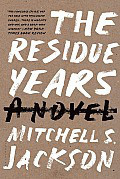A Fresh New Voice to Get Your White Privilege in Check
 “The Residue Years” by Mitchell S. Jackson
“The Residue Years” by Mitchell S. Jackson
I’ve mentioned this before on the site, but I am white. Very white – I’ve never been discriminated against because of color, asked to empty my pockets in a store, worried about getting service in a bar or restaurant, had to think about what colors I would wear that day based on the neighborhoods I would be in.
On the same line, I was raised amazingly middle class. I lacked no essentials growing up. My family never had to choose between necessities or worry about making the mortgage or even make me pay for the total of my education (at least that I know of).
The reason why my race and class is important in this review is simple: all I know about growing up black, growing up poor, growing up with any real disadvantage is what I’ve learned from books and other people’s stories.
I used to tell people I read so much because I was the most boring person in the world – I had to take on other lives and perspectives. Mitchell S. Jackson’s The Residue Years is exactly the type of story I love taking on, simply because this is shit I’d never know and never experience if not for reading amazing first-person stories like this.
The novel itself isn’t a strict autobiography, although it could be. Jackson’s a young black male from a poor neighborhood in Portland, one of the whitest cities in the U.S, who moved onto writing after spending his younger years in prison for drug crimes. God, it’s crazy to think about all the talent sitting around in our jail cells – it’s foolish to think Jackson’s the only smart writer who’s done time.
To the novel, which is told through the eyes of two family members whose lives are torn by the crack epidemic. First, there’s Grace, mother of four boys, just out of rehab (again), trying her hardest to put her faith in God, the program and the goodness of others. Then, (and I’d love to know just how autobiographical this character may be), there’s Champ, a college boy who’s got a way with words, but finds more success and better means for his family by selling on the streets.
The goals of this family are by no means monumental. Champ wants to keep the family home in their possession, wants to set a good example for his little brothers, help keep his mama clean and take care of his girl, the love of his life beauty Kim. Grace just wants to make it this time. She wants to apply for jobs and tell her employers the truth: she’s been busted, gone through rehab, done some wrong, but can work like no other. And later, when her ability to care for the younger boys is called into question, just wants to keep her family intact.
It fucking runs them though, the drugs. Without constant support, without a sign from God or seeing the smile of her boys, it’s hard for Grace not to slip back into her own ways. And when Champ needs money – not for flashy new shoes or to blow on weed – maybe for school, maybe to pay rent on the family home, or later, to provide for his pregnant girlfriend and the upcoming child, the easiest/surest way for a guy of his race/class/status/neighborhood is to hustle.
Geez, I don’t know if there’s a whole lot more for me to say. This is so far from being my story to tell in any way. The writing is terrific, I can’t believe how fresh a voice Jackson’s got. Really though, if you’re in the same boat as me (privileged, white, privileged because you’re white), please read this.





